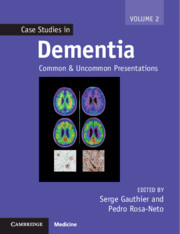Description
Case Studies in Dementia
Common and Uncommon Presentations
Case Studies in Neurology Series
Coordinators: Rosa-Neto Pedro, Gauthier Serge
A clinically useful selection of cases that illustrate the causes and current treatments of cognitive decline in aging.
Language: English
Subject for Case Studies in Dementia:
Publication date: 03-2021
190 p. · 18.9x24.6 cm · Paperback
190 p. · 18.9x24.6 cm · Paperback
Description
/li>Contents
/li>Biography
/li>
Covering the spectrum of cognitive decline in aging using illustrative cases, from mild impairment to dementia, this set of case studies offers a wide-ranging guide for trainees and clinicians. This second volume includes updated research diagnostic criteria and details of new imaging technology, including novel biomarkers such as PET amyloid and tau, to inform readers in clinical practice. Each case includes a clinical history, examination findings and special investigations, followed by diagnosis and discussion, to encourage clinical reasoning, integrative thinking, and problem-solving skills. To reinforce diagnostic skills, the cases include careful analysis of individual presenting patterns and up-to-date information on diagnostic classification and tools. The reader will be able to distinguish patients who need reassurance, closer follow-up or immediate referral to specialized services. With an international authorship, this book is for trainees and clinicians in neurology, psychiatry and neuropsychology.
1. A young missionary with problems for quoting the Bible; 2. Care planning and decision making through the stages of dementia; 3. What is typical and atypical in dementia?; 4. Elderly man repeating questions about upcoming appointments; 5. A devoted wife with an atypical finding; 6. A challenging thesis; 7. A 59 year-old dysexecutive clerk; 8. FTD – behavioral variant frontotemporal dementia; 9. A 59 year-old man with weakness and personality changes; 10. A woman with progressive episodic memory loss and personality change; 11. A man with progressive memory loss and a strong family history of progressive dementia; 12. Long day's journey into night: when the pre-symptomatic phase evolves into manifest disease; 13. Right temporal variant frontotemporal dementia; 14. I'm having trouble working with my spreadsheets; 15. Speechless at first sight; 16. De novo artistic talent in a patient with progressive speech problems; 17. From stuttering to mutism: speech and language deterioration in neurodegenerative disease; 18. Primary progressive aphasia: logopenic progressive aphasia; 19. Alexia without agraphia in a patient with pathologically identified Pick's disease; 20. A meaningless world; 21. Obsessive mandala drawing in semantic dementia; 22. Forced into retirement; 23. Who are these people in my living room?; 24. This case of Parkinsonism that never had a good response to Levodopa; 25. Common complaints: rare pathology; 26. Tremor, hallucinations and cognitive decline; 27. Acute behavioral changes with cognitive impairment; 28. Vascular cognitive impairment; 29. Rapidly progressive behavioral changes and cognitive symptoms in a 29-year-old woman; 30. Hashimoto's encephalopathy as treatable dementia; 31. Hydrocephalus and CSF-related dementia; 32. Something very wrong happened very fast; 33. Siblings with a fatal cause of rapidly progressive dementia; 34. Young women with bipolar disorder history.
Serge Gauthier is the Director of the AD and Related Disorders Unit at McGill University, Montréal Research Centre for Studies in Aging and Professor in the Departments of Neurology and Neurosurgery, Psychiatry and Medicine at McGill University, Montréal.
Pedro Rosa-Neto is an Associate Professor of Neurology, Neurosurgery and Psychiatry and Director of the McGill University, Montréal Research Centre for Studies in Aging. He is also a researcher at the Douglas Institute, Montreal, Canada.
Pedro Rosa-Neto is an Associate Professor of Neurology, Neurosurgery and Psychiatry and Director of the McGill University, Montréal Research Centre for Studies in Aging. He is also a researcher at the Douglas Institute, Montreal, Canada.
© 2024 LAVOISIER S.A.S.




